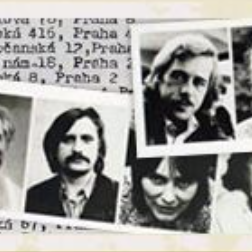 Dissenso e cultura del dissenso in Unione Sovietica
Dissenso e cultura del dissenso in Unione Sovietica
Fonti sul dissenso e scritti di autori del dissenso, segnalati da Elisabeth Kozlowski (Cercec)
The COURAGE project offers a digital database that documents the different collections of dissident materials. Check out their digital exhibition: Exits and Parallel Worlds. http://cultural-opposition.eu/courage/exhibition?
CHRONICLE OF CURRENT EVENTS https://chronicle-of-current-events.com/
A typescript journal, the CHRONICLE OF CURRENT EVENTS was produced every 2-4 months in Moscow by an “anonymous and changing group of human rights activists” (Reddaway).
It offers a unique, uncensored and continuous account of life inside the Soviet Union from 1968 to 1982. Starting with reports from Moscow and Leningrad the periodical’s network of contacts and sources of information expanded over the following 15 years until it regularly included reports about human rights violations (the persecution of believers, the identity of those imprisoned for their beliefs in prisons, labour camps and psychiatric hospitals) from Ukraine, Lithuania, Armenia and other parts of the USSR.
A detailed account of the CHRONICLE‘s origins, development and demise can be found online in the extended Wikipedia entry.
♦
On this website, for the first time, all the translations into English made many years ago may be accessed from one location. (The contents in Russian and the original reports from the 2008 Memorial website can also be located on the menu bar.)
Contents lists are provided for the 64 available issues (1-58, 60-65). Due to the repressive circumstances under which the CHRONICLEoperated one issue (59) was confiscated by the KGB and the last (65) never went into circulation. (See the Chronicle in Russian.)
Many deserve thanks for making this website possible. Some of them are named elsewhere on this site. Nothing would today be possible, however, without the work of the unnamed translators of the 1970s and 1980s who ensured that each issue appeared in English. Many thanks for their contribution — we hope that some of them know of this website’s existence.
Their work, in turn, was organised and finally put on a regular basis by the late Marjorie Farquharson of Amnesty International, who ensured that issues 43 to 64 (December 1976 to June 1982) were translated into English and published as rapidly as possible once the original Russian text of each issue had reached the West.
THE WEBSITE LAUNCH
The Chronicle website was formally launched at Pushkin House (London) on 15 September 2015. The discussion at that event has been uploaded to YouTube and may be watched in its entirety (2 hours) or in the edited highlights (24 minutes).
Our thanks to Pushkin House for hosting the event, to the panel of speakers — Alexander Podrabinek, Martin Dewhirst, Melek Maksodoglu and Josie von Zitzewitz — to Elena Cook, our interpreter for the evening, and to Sarah Hurst who filmed the event.
ADDITIONAL MATERIALS
The detailed annotations by Peter Reddaway in Uncensored Russia, and those provided in the later Amnesty editions, have often been included as a separate Commentary (e.g. No 12) to the respective issue. This serves to show what was known in the West at that time. Occasionally a more recent note has been added by the present editors.
A number of relevant maps, e.g. of the major administrative divisions of Russia (RSFSR) and of the constituent republics of the USSR, have been added to guide readers as to the location of places mentioned in the text.
There are the beginnings of a basic A-Z of biographies of those mentioned most often on the website. We have also begun to include a few photographic materials.
WORK-IN-PROGRESS
We hope to scan and digitise other issues of the CHRONICLE. The loan or donation of hard copies would be appreciated: it makes the scanning process, and proof-reading, much easier.
The translations were admitted by the original editors of the English edition to be “rather literal”. Please contact us if you find anything you consider an important error in translation — we are correcting any mistakes we find as each report is uploaded to the website.
— and do report any links that don’t work.
John Crowfoot and Tanya Lipovskaia
9 April 2019
mailto: crowfoot@uwclub.net





